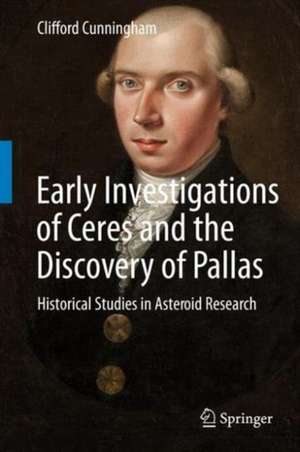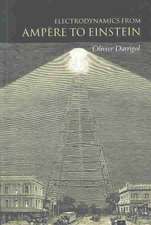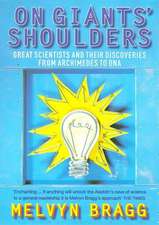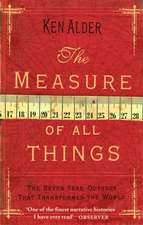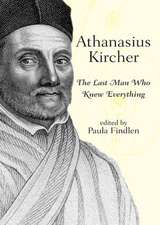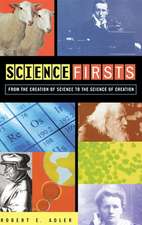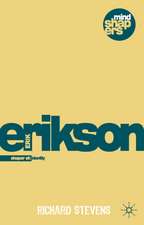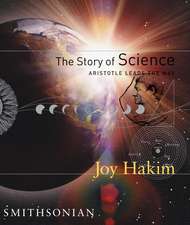Early Investigations of Ceres and the Discovery of Pallas: Historical Studies in Asteroid Research
Autor Clifford Cunninghamen Limba Engleză Hardback – 31 aug 2016
Astronomy was a truly cosmopolitan field at the time, spanning across various disciplines, and the discovery of Pallas, a story completely told in these pages, exemplifies the excitement and drama of early 1800s astronomy. All the private correspondence about the study of Ceres and Pallas in 1802 is given here, which helps to contextualize and personalize the discovery.
| Toate formatele și edițiile | Preț | Express |
|---|---|---|
| Paperback (1) | 570.73 lei 38-45 zile | |
| Springer International Publishing – 9 iun 2018 | 570.73 lei 38-45 zile | |
| Hardback (1) | 594.05 lei 38-45 zile | |
| Springer International Publishing – 31 aug 2016 | 594.05 lei 38-45 zile |
Preț: 594.05 lei
Preț vechi: 742.56 lei
-20% Nou
Puncte Express: 891
Preț estimativ în valută:
113.67€ • 119.11$ • 93.97£
113.67€ • 119.11$ • 93.97£
Carte tipărită la comandă
Livrare economică 07-14 aprilie
Preluare comenzi: 021 569.72.76
Specificații
ISBN-13: 9783319288130
ISBN-10: 331928813X
Pagini: 350
Ilustrații: XIX, 412 p. 181 illus., 18 illus. in color.
Dimensiuni: 155 x 235 x 27 mm
Greutate: 0.96 kg
Ediția:2nd ed. 2016
Editura: Springer International Publishing
Colecția Springer
Locul publicării:Cham, Switzerland
ISBN-10: 331928813X
Pagini: 350
Ilustrații: XIX, 412 p. 181 illus., 18 illus. in color.
Dimensiuni: 155 x 235 x 27 mm
Greutate: 0.96 kg
Ediția:2nd ed. 2016
Editura: Springer International Publishing
Colecția Springer
Locul publicării:Cham, Switzerland
Public țintă
ResearchCuprins
The Triumph of the Human Intellect.- France vs Germany.- Hegel and Ceres.- Piazzi's Deception.- Herschel's New Dynasty.- Origins of the Asteroids.- The Scientific Papers about Ceres.- Biographies.
Recenzii
“The book is a fascinating description of what was taking place at the time in this field of astronomy. … a work of great bibliographic scholarship and as a detailed collection of relevant material from this brief period in asteroidal research will be extremely useful, thought-provoking, and referred to for many years to come.” (David W. Hughes, The Observatory, Vol. 137, August, 2017)
“The author, Clifford Cunningham, is an expert in the History of Astronomy and in particular about the asteroids, on which he authored several books and papers. He therefore represents an authoritative and well-informed source of information. … this book is interesting for its completeness in an intriguing but often overlooked topic of the history of astronomy. Surely worth the reading.” (Gabriella Bernardi, Astrocom et al., astrocometal.blogspot.de, December, 2016)
“The author, Clifford Cunningham, is an expert in the History of Astronomy and in particular about the asteroids, on which he authored several books and papers. He therefore represents an authoritative and well-informed source of information. … this book is interesting for its completeness in an intriguing but often overlooked topic of the history of astronomy. Surely worth the reading.” (Gabriella Bernardi, Astrocom et al., astrocometal.blogspot.de, December, 2016)
Notă biografică
Clifford J. Cunningham earned his Ph.D. in the history of astronomy at the University of Southern Queensland in Australia, and he is a research associate with the National Astronomical Research Institute of Thailand. His undergraduate degrees in physics and classical studies were earned at the University of Waterloo in Canada. He has written or edited 14 books on the history of astronomy, and his papers have appeared in many major journals, including Annals of Science, Journal for the History of Astronomy, Culture & Cosmos, Studia Etymologica Cracoviensia, The Asian Journal of Physics, and Renaissance and Reformation. He is associate editor of the Journal of Astronomical History and Heritage, where several of his asteroid research papers have been published. He is also a contributor to Encyclopedia Britannica, and since 2001 has been the history of astronomy columnist for Mercury magazine. Asteroid (4276) was named Clifford in his honour by the International Astronomical Union based on the recommendation of its bureau the Harvard-Smithsonian Center for Astrophysics.
Textul de pe ultima copertă
An asteroid scholar, Cunningham in this book picks up where his Discovery of the First Asteroid, Ceres left off in telling the story of the impact created by the discovery of this new class of object in the early 1800s. The best and brightest minds of mathematics, science, and philosophy were fascinated by Ceres, and figures as diverse as Gauss, Herschel, Brougham, Kant, and Laplace all contributed something to the conversation. The first few chapters deal with the mathematical and philosophical aspects of the discovery, and the rivalry between Germany and France that so affected science and astronomy of that era. The jockeying for glory over the discovery of Ceres by both Piazzi and Bode is examined in detail, as is the reception given to Herschel’s use of the word 'asteroid.' Archival research that reveals the creator of the word 'asteroid' is presented in this book.
Astronomy was a truly cosmopolitan field at the time, spanning across various disciplines, and the discovery of Pallas, a story completely told in these pages, exemplifies the excitement and drama of early 1800s astronomy. All the private correspondence about the study of Ceres and Pallas in 1802 is given here, which helps to contextualize and personalize the discovery.
Astronomy was a truly cosmopolitan field at the time, spanning across various disciplines, and the discovery of Pallas, a story completely told in these pages, exemplifies the excitement and drama of early 1800s astronomy. All the private correspondence about the study of Ceres and Pallas in 1802 is given here, which helps to contextualize and personalize the discovery.
Caracteristici
Continues from 1802 where earlier volume left off to reveal more on the history of the discovery of the first asteroid, emphasizing the mathematical and philosophical aspects of it Whereas the first book contained correspondence and monographs, this volume contains all the scientific papers written about Ceres in the early days, many translated into English from German for the first time Based on extensive archival research on Ceres
